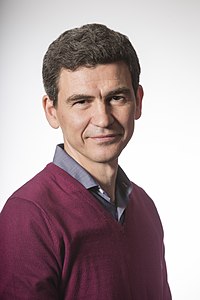This biographical article is written like a résumé. (November 2020) |
Mihai Netea | |
|---|---|
 Mihai Netea in 2016 | |
| Born | 1968 |
Mihai G. Netea (born 1968, Cluj, Romania) is a Romanian Dutch physician and professor at Radboud University Nijmegen, specialized in infectious disease, immunology, and global health.
Netea studied medicine at the Medico-Pharmaceutical Institute in Cluj-Napoca.[1] He received a doctoral degree in 1998 at Radboud University, with a dissertation on the role of cytokines in sepsis,[2] written under the direction of Jos van der Meer.[1]
He joined the University of Colorado as a postdoctoral researcher and then returned to conclude his clinical training as an infectious diseases specialist.[3] Since 2008 he heads the division of Experimental Medicine, Department of Internal Medicine, Nijmegen University Nijmegen Medical Center.[2]
Netea's field of study includes the innate immune system and its capacity to "memorize" infections,[3] as well as its recognition of Fungi pathogens. He examined system's response to Candida albicans, a sepsis trigger. Additionally, he tried to search for genetic diseases that can make individuals more vulnerable to this type of infections.[2]
Netea co-published more than 900 scientific papers[4] in journals such as New England Journal of Medicine, Nature, Science, and PNAS.[2]
For his academic work, Netea received several grants: a Vidi grant in 2005, a Vici grant in 2010, and European Research Council Consolidator Grant in 2012.[2] In 2016, he was awarded the Spinoza Prize.[5][6] He is a member of Academia Europaea since 2015 and of the Royal Netherlands Academy of Arts and Sciences since 2016.[5][7][8]
Netea is known for his breakthrough in the area of Trained immunity Netea, Mihai G.; Joosten, Leo A. B.; Latz, Eicke; Mills, Kingston H. G.; Natoli, Gioacchino; Stunnenberg, Hendrik G.; o'Neill, Luke A. J.; Xavier, Ramnik J. (2016). "Trained immunity: A program of innate immune memory in health and disease". Science. 352 (6284). Science Mag: aaf1098. doi:10.1126/science.aaf1098. PMC 5087274. PMID 27102489.. Netea's research attempts to translate information obtained through the assessment of human genetic variation in patients into novel diagnostic and therapeutic approaches.
- ^ a b "FELICITĂRI! Mihai Netea, un cercetător din Cluj, primeşte "Nobelul Olandei". Este considerat un pionier în domeniu". clujcapitala.ro (in Romanian). June 13, 2016. Retrieved April 16, 2020.
- ^ a b c d e "Mihai Netea: A new idea in immunology". Radboud University Nijmegen. Archived from the original on April 14, 2020. Retrieved April 14, 2020.
- ^ a b "Prof. Mihai G. Netea MD PhD". ISCOMS. Archived from the original on January 20, 2017. Retrieved April 14, 2020.
- ^ "Prof.dr. M.G. (Mihai) Netea. Publications". NARCIS. Retrieved April 14, 2020.
- ^ a b "Mihai Netea. Personal prizes & awards (national & international)". Radboud University Nijmegen. Archived from the original on April 14, 2020. Retrieved April 14, 2020.
- ^ "NWO Spinoza prize 2016". Netherlands Organisation for Scientific Research. Archived from the original on 11 April 2020.
- ^ "Mihae Netea". Academia Europaea. Archived from the original on 28 March 2019.
- ^ "Mihai Netea". Royal Netherlands Academy of Arts and Sciences. Archived from the original on 18 April 2020.